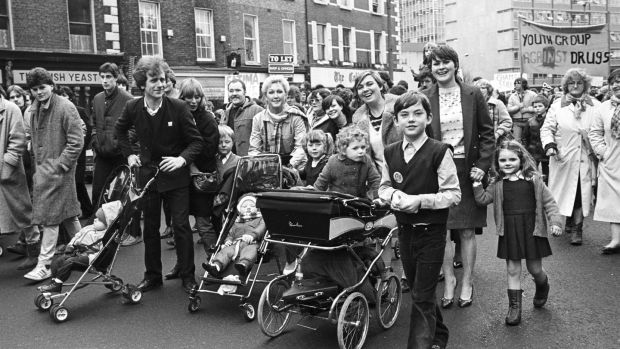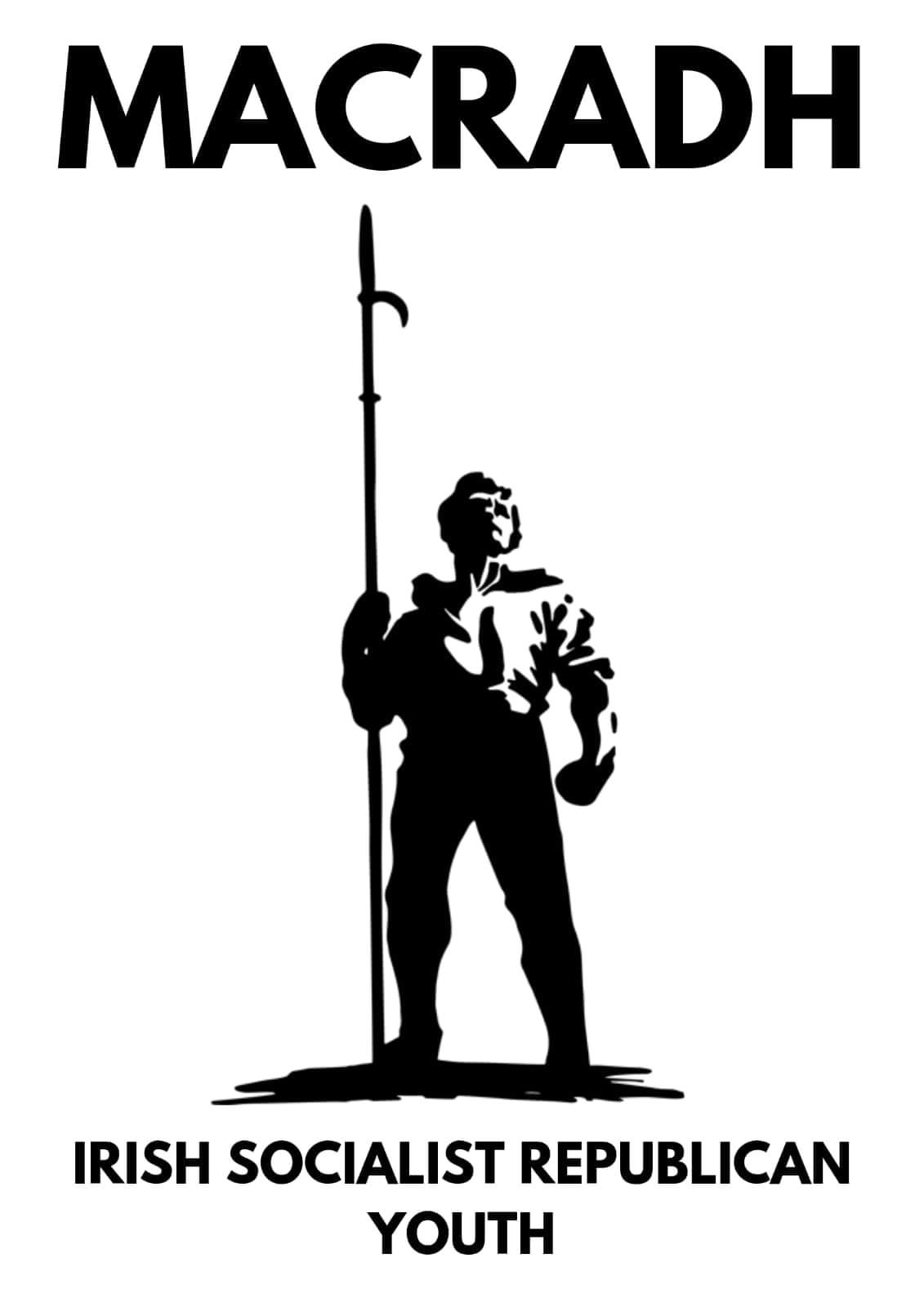This week, Macradh ISR Youth continues it’s Women in Struggle interviews with Socialist Republican and Anti Fascist Mags Glennon
Can you tell us a bit about yourself and what inspired you to get involved in revolutionary politics?
I’m in my 50s now and come from a rural working class background, generations of herds and farm labourers mainly. These are the kind of low paid jobs where years back both women and men worked on the land, and even now these roles are seen as ‘menial’ and unskilled, when the opposite is true. So I was always aware of that general class difference in my own experience. My parents met in London in the 60s and I was born there, which was another aspect of class politics and my parents giving us a sense of Irishness and trips home, etc. My Dad told me about James Connolly and his death when I was about 5. I remember Frank Stagg dying and whispered talk about ‘The Troubles’, bomb scares, etc. but I was too young to understand it really. We came home for good when I was ten. The first protest I was at was a massive rally in the Midlands during the Hunger Strike Election in June 1981. We waited for ages in the pissing rain to hear Bernadette McAliskey speak, she was still on crutches after the loyalist murder attempt. The hunger strikes had a huge effect on on my generation.
Do you feel that women revolutionaries and the role they have played in revolutions in the past is not appreciated and lacks the acknowledgement it should get?
Well in general the experiences of women in society have not been recognised, look at the arts, science, literature; historically the number of prominent women could be counted on one hand compared to the men. Even in the mid 19th century women were publishing under male pen names. In Irish Republican history the role of women is obscured. It is often said that the ‘rebel gene’ is handed down the female line – not physically as such but through the educational and nurturing role of mothers in the child’s formative years. I think this is generally true. Also but for the unrewarded background work of women no resistance struggle could continue. This was true for the women who opposed internment and broke the Brit blockades in Belfast in the 70s. Also the leadership of the IRB was wiped out in 1916, but within months the Republican movement was back up and running through the work of women revolutionaries. You had people like Kitty Doherty acting as a courier from America with information and vast sums of money, providing arms for the war. Most people have no idea who she was.
From your experience do you feel that women are under represented in revolutionary politics today? In your opinion can revolutionary organizations do more to recruit female activists and if so what can they do?
It depends a lot on what you mean by ‘revolutionary politics’. I don’t see revolutionary politics as what occurs in small ‘left wing’ groups squabbling over who is the best grouplet or loudest leader. That is just a reflection of general bourgeois politics. The most anti-establishment political activity I have seen was the community anti-drugs campaigns in the 1990s in Dublin. People rose up spontaneously in working class areas all across the city in a fight to save their communities and their children from the heroin dealers. And those people were overwhelmingly women, the actual marchers and organisers. The problem arose when women were asked to join committees, or be spokespersons. It was very rare to get more than one or two women to do that, while the smaller numbers of men queued up. So the involvement of women gets crowded out because history is largely recorded as the narrative of ‘leaders’.

I think that one of the problems is most definitely confidence and formal education, the background you have been brought up in. I ended up in college almost by accident. I went to a tech and was the only one from my Leaving class to go to university. For the first year I hardly opened my mouth at meetings or such, then I realized that 95% of what politicos and debating people were saying was b***ix. The people coming out with rubbish like ‘The Birmingham 6 are Guilty’ or ‘The IRA are Wrong’ were those who went to private schools and were groomed to be leaders, etc from childhood. And that continues on throughout their lives, I mean look at some of the clowns in the cabinet! It’s all about maintaining the establishment, and the vast number of the ‘revolutionaries’, unfortunately, are the same – they just slot into their allotted roles.
I have met several ex-POWs, men actually, who have really good politics but absolutely refuse to speak in public, at meetings. They say they do not have the confidence to do so. This is tragic for real revolutionary politics. So I think we each have to encourage the individual woman, or man, on a personal level. And to actually develop structures to encourage people to share their views and build up their ability to express themselves in public.
Who would you say your revolutionary heroes are?
Well I suppose people like James Connolly, or Mairead Farrell, but they would be obvious. One I would pick out would be Ada English, who is not very widely known. She was one of the first women in Ireland to qualify as a psychiatrist and had a long and distinguished career in this role. She was also a member of Cumann na mBan, serving with Mellows in 1916 and she was with Cathal Brugha to the end in Hammans Hotel in 1922. She was one of the very few TDs to oppose the Treaty on the grounds of the continued British occupation of the 6 counties. In the Treaty debates she also lashed the sexism of TDs who patronised female Republicans “I think it was a most brave thing today to listen to the speech by the deputy from Sligo (Alexander McCabe) in reference to the women members of An Dáil, claiming that they only have the opinions they have because they have a grievance against England, or because their menfolk were killed and murdered by England’s representatives in this country. It was a most unworthy thing for any man to say here. I can say this more freely because, I thank my God, I have no dead men to throw in my teeth as a reason for holding the opinions I hold. I should like to say I think it most unfair to the women Teachtaí because Miss McSwiney has suffered at England’s hands”.
As Socialist Republicans Macradh-ISR believe in proletarian feminism believing that true liberation of women will only be achieved when capitalism and the male patriarchy is smashed. What is your opinion on this?
Well ultimately Yes, of course. But women can’t wait for such ‘true’ liberation, we must make what gains we can along the way. I mean we could hardly wait until the Revolution in the distant future to Repeal the 8th Amendment. And can we say that post-revolution women will not be subjected to sexual violence or gender based discrimination? However it is very positive to see the increasing activity of women in progressive politics in the past decade, be it the ‘Yes’ campaign here in 2018, or the role of female militant revolutionaries in Rojava for example. But the key element is ‘proletarian feminism’; there is not much point in decrying ‘feminism as middle class’ or ‘idpol posturing’ if we don’t challenge this reality by encouraging the involvement of women in working class politics.
Finally do you have any advice for women with revolutionary ideals that are hesitant to get involved in revolutionary politics due to under representation or other reasons?
I hope I have touched on some of these points in other answers. I would urge women to get involved in activity in their communities, it might be just a small campaign for a playground, or whatever matter locally. The key thing about getting people involved in politics is it has to be what the person/community is interested in, not high falutin’ theory which is essentially telling people they are too thick to understand it. Women should also be encouraged to use their individual talents, as writers, communicators, or whatever. I would also encourage women to avail of all educational opportunities open to them, because you can’t truly oppose the reactionary nonsense that we are subjected to unless you can recognize and combat it intellectually. As Damo sings ‘You will never kill our will to be Free – inside our minds we hold the key!’

